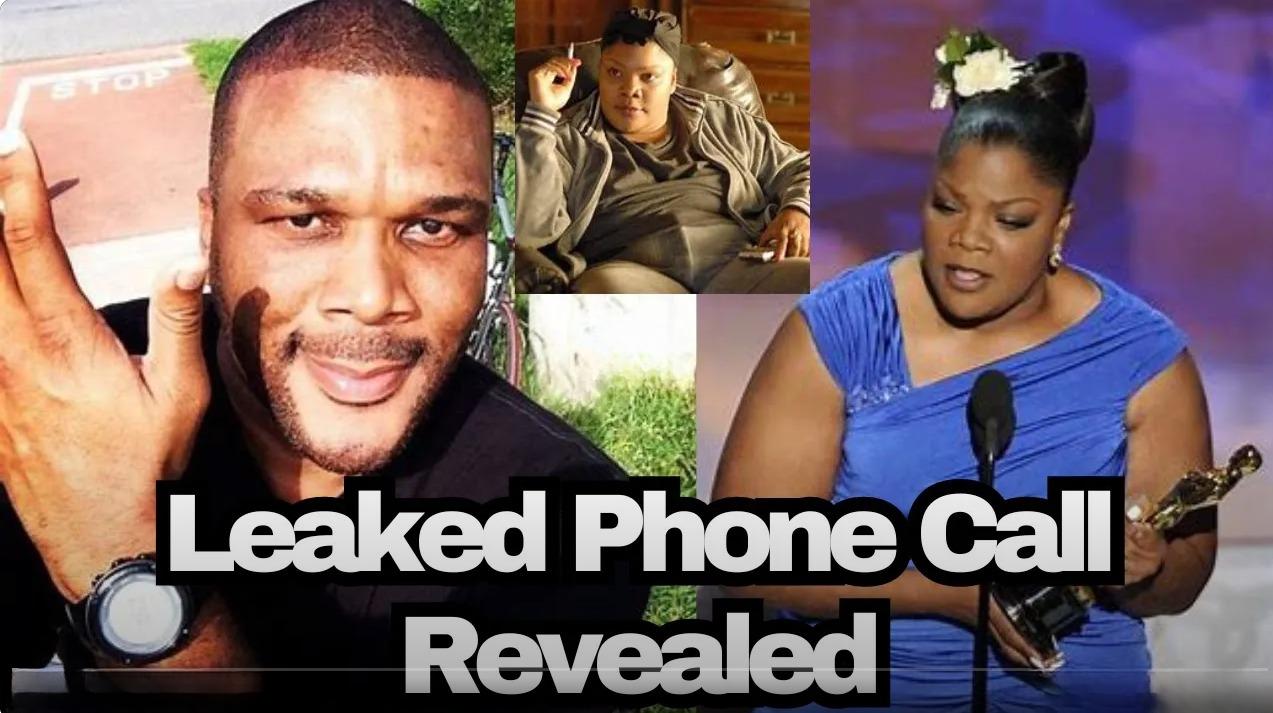In a raw and unfiltered exchange between two prominent figures in the entertainment industry.
Tyler Perry and Mo’Nique grappled with issues of fairness, respect, and accountability.

The conversation, which unfolded over the phone, delved into the complexities of their past interactions and the lingering impact on both parties.
At the heart of the discussion was Mo’Nique’s assertion that she had been mistreated and unfairly portrayed by Perry and others within the industry.
Her grievances stemmed from a perceived lack of support and respect, particularly in the aftermath of her acclaimed performance in the film “Precious.”
Mo’Nique felt that her refusal to participate in certain promotional activities without proper compensation had led to her being labeled as difficult to work with—a characterization she vehemently contested.
Perry, for his part, acknowledged the challenges Mo’Nique faced but struggled to reconcile her grievances with his own experiences and obligations.
He cited logistical difficulties and contractual obligations that had influenced their professional interactions, emphasizing the need to separate personal feelings from business decisions.
Yet, Mo’Nique persisted in seeking acknowledgment of her perspective and a genuine effort to address the underlying issues.
Throughout the conversation, Mo’Nique implored Perry to consider the impact of his actions and to demonstrate solidarity with her cause.
Drawing parallels between their shared experiences as Black artists navigating a predominantly white industry.
She urged Perry to use his influence and resources to advocate for fairness and equality.
Mo’Nique’s impassioned plea was rooted in a desire to hold Perry—and the industry at large—accountable for perpetuating systemic inequities.
As the dialogue unfolded, it became evident that the issues at hand were not merely about money or contracts but about dignity, respect, and representation.
Mo’Nique’s insistence on being heard and validated reflected a broader struggle for recognition and empowerment within the entertainment industry.
Her willingness to confront uncomfortable truths and challenge established power dynamics underscored the urgency of addressing systemic injustices.
In response, Perry expressed a willingness to engage in constructive dialogue and seek resolution, albeit within the confines of his own constraints and priorities.
While he stopped short of making specific commitments, Perry acknowledged the need for greater empathy and understanding in their interactions.
He recognized the importance of standing up for what is right and vowed to reflect on his own actions and responsibilities as a prominent figure in the industry.
Ultimately, the conversation between Perry and Mo’Nique transcended individual grievances to confront larger issues of representation, fairness, and solidarity within the entertainment industry.
Their candid exchange served as a reminder of the ongoing struggle for equality and justice, both on and off the screen.
As they parted ways, both parties expressed a commitment to continue the dialogue and work towards a more equitable future for all artists.
News
Confirmados todos los rumores sobre Rocío Carrasco y Fidel Albiac: ‘Te lo juro’ (N)
Se confirma lo que está sucediendo en realidad entre la hija de Rocío Jurado y su marido Fidel Albiac Alba Carrillo comentaba este lunes en Mañaneros la presencia de su amiga Rocío Carrasco el pasado fin de semana en un evento en…
El chico que ha besado a Leonor en Brasil tiene un verdadero problema: ‘Hay más…’ (N)
Leonor le complica la vida a su nueva ilusión tras ser pillada dejándose llevar en los carnavales de Brasil Leonor sorprendió el pasado miércoles cuando fue pillada besándose con un misterioso joven en los carnavales de Brasil. Este hecho que…
Tensión en ‘TardeAR’ por lo ocurrido entre Verónica Dulanto y Jacobo Ostos (N)
En el plató de ‘TardeAR’ se ha vivido un momento de tensión por lo que ha sucedido entre Verónica Dulanto y Jacobo Ostos El programa de hoy de TardeAR ha estado marcado por la visita de Jacobo Ostos al plató y su presencia ha…
Carmen Borrego cruza los límites con Alexia Rivas en ‘GH Dúo’: ‘Ya no tienes…’ (N)
Carmen Borrego y Alexia Rivas protagonizan un increíble enfrentamiento en directo La última gala de GH Dúo estuvo marcada por la tensión y el enfrentamiento entre Carmen Borrego y Alexia Rivas. La controversia estalló cuando se anunció que José María Almoguera,…
Duelo de titanes en ‘GH DÚO’ tras la salvación de un nominado (N)
Ion Aramendi anuncia a un nuevo salvado de la expulsión más decisiva de esta edición de ‘GH DÚO’ ‘GH DÚO’ se enfrenta esta semana a una de sus nominaciones titánicas. La gala del jueves pasado, dedicada a San Valentín, dejaba una…
EL DRAMA DE ANABEL PANTOJA. “PIERDE 60.000 €”.(N)
El drama de Anabel Pantoja: “Pierde 60.000 €” Anabel Pantoja, una de las figuras más mediáticas del corazón español, ha vuelto a ser el centro de la atención tras la noticia de que ha perdido una importante suma de dinero….
End of content
No more pages to load











